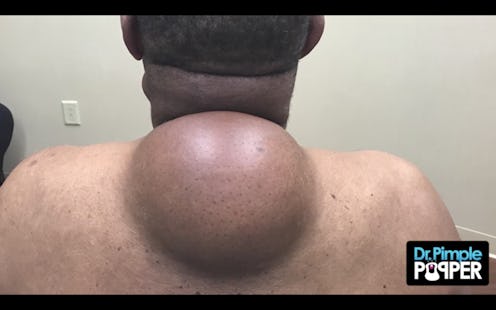Life
Here’s Why We’re So Fascinated By Pimple Popping Vids, According To Science
Of all the bizarre elements of human psychology exposed to the world by the invention of the internet, the rise of the pimple-popping video has to be one of the most bizarre — and amazing. Dermatologist Dr. Sandra Lee, otherwise known as "Dr. Pimple Popper," is one of Youtube's breakout stars thanks to her clips of pimples, cysts, blackheads and other skin nasties that she prods, pokes, and clears with plastic gloves and professional devices. Her most popular videos have views into the millions, and she's only one of a cluster of pimple popping media available. Why in the world are we so fascinated by pimple popping videos? As with most things, science has an answer.
The psychology behind the popularity of pimple-popping spectacles is more complex than it seems, and there isn't one definitive explanation that rationalizes the entire experience. Our fascination with watching the pus explosions of others seems to be due to a combination of neural dopamine and tension release, the lure of the forbidden, cultural ideas of disgust, and socially evolved concepts of grooming and intimacy. Surprisingly, scientists have proved rather reluctant to study the legions of pimple popping fans in detail, so all of these ideas remain hypothetical. (Maybe they're simply too busy watching Dr. Lee's videos themselves — and getting one of her pimple-popping surgical devices, which are available for purchase, to take home.)
We Crave Suspense And Relief Without Any Danger
Part of the enjoyment we derive from watching pimple-popping comes, according to experts, from the emotional consequences of popping zits on oneself. It is, for many of us, a deeply satisfying activity that first becomes rewarding in our blemish-filled teens. Neuroscientist Heather Berlin, interviewed by Refinery 29, explained that “There’s a cycle of anxiety or arousal before the act [of pimple-popping] and a sense of relief after," and that the relief itself can be addictive, as it releases a rush of dopamine in the brain. The "narrative" of the videos of Dr. Lee and others is simple: a pressure, or pain, is released and cleansed. And our brains react to that positively.
Popping video fans interviewed by the Guardian in 2015 tended to use the rhetoric of "soothing" and "relaxation" to describe why they loved watching Dr. Lee and co. do their work. The act of a pimple being popped, or a cyst being lanced, is both a physical and a mental release of pressure: It sets up suspense and then lets it go, allowing audiences to breathe out.
Videos also add an extra element of protection, in that they're happening to somebody else. Rather like horror movies, it's suggested, pimple-popping clips allow people to vicariously experience the physical benefits of a pop without encountering any of the negative side effects of actually being in the situation, from pain to nerves or risk of infection or scarring. In that sense, the videos present all the relaxing benefits without providing any actual threat or risk. However, there's another variant on this idea. While Dr Lee and other medical pimple extractors do so in a safe, disinfected environment, the popularity of at-home videos showing unpracticed laypeople going at pimples with unsterilized instruments is also vast, and may point to our fondness for watching disasters.
We Love Gross Stuff
The human fascination with the visuals of disgust at play in pimple-popping videos seems to defy psychology. Disgust is hardwired into the human brain; our "eww" response is a behavior designed to stop us getting sick or encountering danger by making us avoid potentially upsetting substances and areas. Given that, you'd think that pus and the other materials inside a 25-year-old zit would turn us off. For many people, that is indeed the case, but for legions of fans of pimple popping videos, the release of seeing a built-up pore finally cleaned out is worth every second.
Historians of disgust point out that our definition of "disgusting" changes with our culture; as standards of hygiene and behavior shift, so does our degree of repugnance. Some of our pimple-popping fascination in the modern world may come from the fact that it's no longer perceived as greatly disgusting, but part of it may also come from our excitement and titillation at seeing something controversial, intimate and forbidden.
We Love Grooming
When it comes to our approach to pimple-popping itself, onscreen or off, psychological approaches drawn from primates may suggest another explanation. Among many primate species, grooming — picking through the hair and skin of others, combing, finding insects, and generally managing one another's appearance — serves a social function. It's hygienic, but it also bonds primate groups together, reinforces social hierarchies, and helps conflict resolution and communication.
Some theorists believe that grooming behaviors among humans, including zit-popping between partners, families and friends (yes, all those videos also exist), continue to serve that function. It might serve the same purpose that brushing a child's hair or doing a friend's make-up does: expressing bonds and intimacy. It's possible that audiences of pimple-popping videos feel an ancient sense of closeness with the person they're watching, though, again, this hasn't been explored by scientists specifically.
Amid all these explanations, there's no real sense that watching a pimple popping video or ten is unhealthy or psychologically problematic. If you're developing a fixation with them, though, or are motivated to pick your own skin to excess by viewing them, they may be a trigger for compulsive behavior, and you should consider seeing a professional therapist. No, not Dr. Lee.
